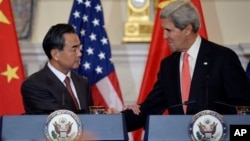STATE DEPARTMENT —
U.S. Secretary of State John Kerry and Chinese Foreign Minister Wang Yi, meeting in Washington ahead of next week's opening of the United Nations General Assembly, discussed nuclear weapons in North Korea, chemical weapons in Syria and maritime security in the South China Sea.
Secretary Kerry and Foreign Minister Wang also discussed mutual concerns from Syria and Iran to Beijing's territorial disputes with neighbors.
"From our dialogue on intellectual property to maritime security and human rights, we are committed to working through difficult issues, and, as you can tell, we have a very big agenda,” said Kerry.
Wang said it's important to make progress.
"We look forward to making non-conflict and confrontation, mutual respect, and win-win cooperation part of all aspects of the China-U.S. relationship to benefit both countries," said Wang.
Washington hopes that better relations with China will help resolve Beijing's conflict with Tokyo over islands in the East China Sea. Competing patrols have raised tensions as has Japan's suggestion that it may station government workers there.
Commenting on the ongoing situation, Chinese Foreign Ministry Spokesman Hong Lei said, "China has an unshakeable resolve and determination to protect our territorial sovereignty and will not tolerate any escalation. If the Japanese side recklessly makes provocative moves, it will have to accept the consequences."
Japan's Prime Minister Shinzo Abe has also opined that Tokyo cannot ignore territorial challenges.
"We have to read the landscape of international relations with our own eyes, use our heads to figure out Japan's role, and take actions with our legs," said the Prime Minister.
The Obama administration has tried to stay out of this dispute despite a security treaty with Japan. Michael Auslin of the American Enterprise Institute says it's similar to Washington's "strategic ambiguity" over China and Taiwan.
"You make clear your interests but you really never express your full thoughts on the issue. For example, when would you actively defend your ally?" asked Auslin.
China is also facing competing claims in the South China Sea from the Philippines, Vietnam and other countries. Manila is considering removing concrete blocks it believes China placed in the disputed waters as part of its claim.
Commenting on that issue, Chinese Foreign Ministry Spokesman Hong Lei pointed out, "Chinese activities around the islands and surrounding waters are completely within Chinese sovereignty. We ask the Philippines to stop provocative actions, to see eye-to-eye with China and protect the peace and stability in the South China Sea."
Auslin says Washington is professing no opinion on this dispute either, noting "if we really didn't have a position, we wouldn't care how it's resolved and we wouldn't care what China did. But we have treaty allies that we're dealing with, particularly the Philippines, and we have other countries that we're feeling closer to over time, including Vietnam."
The Philippines has taken its case to the United Nations Convention on the Law of the Sea, but Beijing has rejected Manila's request for arbitration, insisting that delineating maritime boundaries is a sovereignty issue not covered by that U.N. body.
Secretary Kerry and Foreign Minister Wang also discussed mutual concerns from Syria and Iran to Beijing's territorial disputes with neighbors.
"From our dialogue on intellectual property to maritime security and human rights, we are committed to working through difficult issues, and, as you can tell, we have a very big agenda,” said Kerry.
Wang said it's important to make progress.
"We look forward to making non-conflict and confrontation, mutual respect, and win-win cooperation part of all aspects of the China-U.S. relationship to benefit both countries," said Wang.
Washington hopes that better relations with China will help resolve Beijing's conflict with Tokyo over islands in the East China Sea. Competing patrols have raised tensions as has Japan's suggestion that it may station government workers there.
Commenting on the ongoing situation, Chinese Foreign Ministry Spokesman Hong Lei said, "China has an unshakeable resolve and determination to protect our territorial sovereignty and will not tolerate any escalation. If the Japanese side recklessly makes provocative moves, it will have to accept the consequences."
Japan's Prime Minister Shinzo Abe has also opined that Tokyo cannot ignore territorial challenges.
"We have to read the landscape of international relations with our own eyes, use our heads to figure out Japan's role, and take actions with our legs," said the Prime Minister.
The Obama administration has tried to stay out of this dispute despite a security treaty with Japan. Michael Auslin of the American Enterprise Institute says it's similar to Washington's "strategic ambiguity" over China and Taiwan.
"You make clear your interests but you really never express your full thoughts on the issue. For example, when would you actively defend your ally?" asked Auslin.
China is also facing competing claims in the South China Sea from the Philippines, Vietnam and other countries. Manila is considering removing concrete blocks it believes China placed in the disputed waters as part of its claim.
Commenting on that issue, Chinese Foreign Ministry Spokesman Hong Lei pointed out, "Chinese activities around the islands and surrounding waters are completely within Chinese sovereignty. We ask the Philippines to stop provocative actions, to see eye-to-eye with China and protect the peace and stability in the South China Sea."
Auslin says Washington is professing no opinion on this dispute either, noting "if we really didn't have a position, we wouldn't care how it's resolved and we wouldn't care what China did. But we have treaty allies that we're dealing with, particularly the Philippines, and we have other countries that we're feeling closer to over time, including Vietnam."
The Philippines has taken its case to the United Nations Convention on the Law of the Sea, but Beijing has rejected Manila's request for arbitration, insisting that delineating maritime boundaries is a sovereignty issue not covered by that U.N. body.
